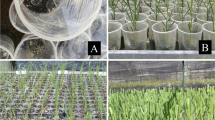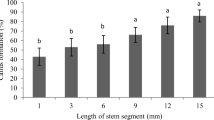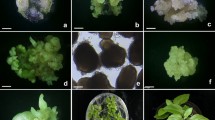Abstract
We report here a method of ‘two cycles of selection’ for rapidly establishing rice embryogenic cell suspensions which had high regeneration potential even after long-term culture (up to 14 months). Embryogenic calli were induced from immature embryos of 17 genotypes of cultivated japonica rice (Oryza sativa L.) and tested for their regeneration potential. Five of the 17 genotypes showed relatively high regeneration frequencies (27%–45%) and were selected. This process was the first cycle selection, namely, the selection for responding genotypes. The second cycle of selection, or the selection for responding individual callus, was then conducted. Calli from different immature embryos of the same genotype were found to differ in regeneration potential, therefore calli with high regeneration potential were selected again in each of the five genotypes. Five finely-dispersed and rapidly-growing embryogenic cell suspensions, one for each of the genotypes, were established from the calli chosen by the two cycles of selection. The regeneration potential of these cell suspensions was tested every two months over a period of 14 months. All of the five genotypes retained high regeneration frequency (above 62%) over the whole period tested.
Similar content being viewed by others
Abbreviations
- 2,4-d :
-
2,4-dichlorophenoxyacetic acid
- BA:
-
6-benzyladenine
- CH:
-
casein enzymatic hydrolysate
- NAA:
-
α-naphthalene acetic acid
- PCV:
-
packed cell volume
References
Bharadwaj S, Narayanan KK & Thomas J (1994) Etiolation increases the efficiency of protoplast isolation from rice seedling tissues. Rice Biotech. Quart. 20: 2–4
Chu CC (1978) The N6 medium and its applications to anther culture of cereal crops. In: Proc. of Symp. on Plant Tissue Cult. (pp 43–45). Sci. Press, Beijing
Ghosh GC & Zapata FJ (1990) Callus formation and plant regeneration from protoplasts derived from suspension cultures of rice (Oryza sativa L. cv. ‘Taipei 177’). Plant Breed. 105: 95–100
Müller AJ & Grafe R (1978) Isolation and characterization of cell lines ofNicotiana tabacum lacking nitrate reductase. Mol. Gen. Genet. 161: 67–76
Murashige T & Skoog F (1962) A revised medium for rapid growth and bioassays with tabacco tissue cultures. Physiol. Plant 15: 473–497
Sticklen MB (1991) Direct somatic embryogenesis and fertile plants from rice root cultures. J. Plant Physiol. 138: 577–580
Vasil IK (1987) Developing cell and tissue culture systems for the improvement of cereal and grass crops. J. Plant Physiol. 128: 193–218
Vasil V & Vasil IK (1985) Isolation and maintenance of embryogenic cell suspension cultures of gramineae. In: Vasil IK (ed) Cell Culture and Somatic Cell Genetics of Plants, Vol 1 (pp 152–157). Academic Press, Orlando
Yan OF, Wang JH & Huang CN (1994) Research on the cryopreserved rice cells. Acta Biol. Exp. Sin. 27: 399–404
Author information
Authors and Affiliations
Rights and permissions
About this article
Cite this article
Wenjing, T., Bao, L. & Miao, X. Establishing japonica rice suspensions retaining a high regeneration potential after 14 months of culture. Plant Cell Tiss Organ Cult 47, 213–216 (1997). https://doi.org/10.1007/BF02318975
Received:
Accepted:
Issue Date:
DOI: https://doi.org/10.1007/BF02318975




